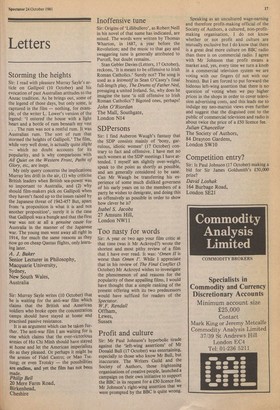Storming the heights
Sir: I read with pleasure Murray Sayle's article on Gallipoli (10 October) and his evocation of past Australian attitudes to the Anzac tradition. As he brings out, some of the legend of those days, but only some, is captured in the film — nothing, for example, of the writer L. Lower's version of the legend: 'I entered the house with a light heart and a bottle of rum beneath my vest . . . The rum was not a restful rum. It was Australian rum. The sort of rum that stormed the heights of Gallipoli.' The film, while very well done, is actually quite slight — which no doubt accounts for its popularity, and is why comparisons with All Quiet on the Western Front, Paths of Glory, etc, are inept.
My only query concerns the implications Murray lets drift in the air, (1) why criticise British leaders when British sea-power was so important to Australia, and (2) why should film-makers pick on Gallipoli when they haven't faced up to the issues raised by the Japanese threat of 1942-45? But, apart from 'a proposition is what it is and not another proposition', surely it is the case that Gallipoli was a bungle and that the first war was not at all a genuine cause for Australia in the manner of the Japanese war. The young men went away all right in 1914, for much the same reasons as they now go on cheap Qantas flights, only learning later.
A. J. Baker Senior Lecturer in Philosophy, Macquarie University, Sydney, New South Wales, Australia
Sir: Murray Sayle writes (10 October) that he is waiting for the anti-war film which claims that the British and American soldiers who broke open the concentration camps should have stayed at home and Practised passive resistance.
It is an argument which can be taken further. The anti-war film I am waiting for is one which claims that the ever-victorious armies of Ho Chi Minh should have stayed at home and let the American imperialists do as they pleased. Or perhaps it might be the armies of Fidel Castro; or Mao Tsetong; or even Trotsky — the possibilities are endless, and yet the film has not been made.
Philip Bell
20 Mere Farm Road, Birkenhead, Cheshire


































 Previous page
Previous page